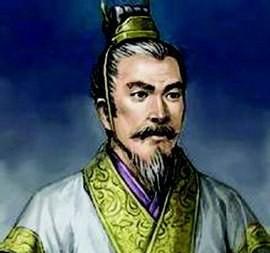Liu Xi (born and died unknown, born around 160), male, or Liu Xi, courtesy name Chengguo, was a native of Beihai (present-day Changle, Shandong), and an official of Nan'an Taishou. Eastern Han Dynasty scholar and hermeneuticist. Born at the end of the Han Dynasty, the world of the spirit, the emperor Jian'an zhong once avoided Jiaozhou. According to Chen Shou's Chronicle of the Three Kingdoms, the Wu people Cheng Bing, Xue Zong, and xu Ci of the Shu people all studied from Xi Qing. He is the author of "Interpretation of Names" and "Notes on Mencius", of which "Interpretation of Names" is an important exegetical work in China and has a great influence on future generations. Liu Xi's "Notes on Mencius" is no longer transmitted.

Born at the end of the Han Dynasty, the world of the spirit, the emperor Jian'an zhong once avoided Jiaozhou. According to Chen Shou's Chronicle of the Three Kingdoms, the Wu people Cheng Bing, Xue Zong, and xu Ci of the Shu people all studied from Xi Qing. He is the author of "Interpretation of Names" and "Notes on Mencius", of which "Interpretation of Names" is an important exegetical work in China and has a great influence on future generations. The Chronicle of the Three Kingdoms, Wushu Wei Yao (魏曜傳) records that Wei Yao (wei Zhao, the Jin dynasty avoided Sima Zhao, and changed it to Yao) wrote in prison: "See also Liu Xi's 'Interpretation of the Name'. Wei Zhao was imprisoned in the second year of Sun Hao's phoenix (273), according to which it can be seen that his book had been widely circulated at the end of Wu and was valued by scholars. Wei Zhao also mentioned that he had gained or lost when he saw the contents of Liu Xi's "Interpretation of Names", and that the matter of titles he talked about was inevitable or wrong, so he composed one volume each of the "Official Training" and "Interpretation of Names" to correct and fill in the gaps for Liu Xi. Later, Northern Qi Yan Zhitui also mentioned Liu Xi's "Interpretation of Names" in his "Yan Family Training and Phonetics", in which he said:
The people of Kyushu have different speeches, and since they were born, they have always been the same. Since the "Spring and Autumn" marked the transmission of the qi words, the "Departure from the Troubles" of the Scripture of the Words, this cover its brighter beginning also. Later, Yang Xiong wrote "Dialects", and his words were prepared. However, they all examine the similarities and differences of famous objects, and do not show the right and wrong of sound reading. Arresting Zheng Xuan's annotation of the Six Classics, Gao Lui's Interpretation of "Lü Lan" and "Huainan", Xu Shenzao's "Sayings", and Liu Xi's "Interpretation of Names", there were initially false loans to prove the phonetic character ear. Here it is clearly pointed out that the book "Interpretation of names" is "falsely borrowed to prove the phonetic characters".
"Interpretation of Names", a book that explains the meaning of words. At the end of the Eastern Han Dynasty, Liu Xizuo's "Interpretation of Names" is a work that deduces the origin of the meaning of words from the perspective of language sounds, which explains the reasons why things are so named, and notes the similarities and differences between the pronunciation and ancient sounds at that time. The "Interpretation of the Name" was widely circulated in the late Wu Dynasty and was valued by scholars. It has a great influence on the hermeneutics of later generations, and is also a key point in the study of Chinese etymology, and its style is modeled after the Erya. After the "Interpretation of names" was produced for a long time, no one sorted it out, and in the Ming Dynasty, Lang Kuijin engraved it together with "Erya", "Xiao Erya", "Guangya", and "Piya", called "Wuya Quanshu". Because the other four books are all named "Ya", the "Interpretation of names" is changed to "Yi Ya". Since then, "Interpretation of the Name" has also been called "Yiya".
The Interpretation of names consists of 8 volumes. The beginning of the volume is from the preface cloud: since ancient times, the utensils and things are "named elegantly, and the names of all parties are special... The names of the husbands have their own meanings in reality, and the people are called by the day, but do not know their meaning, so they write the heavens and the earth, yin and yang, the four hours, the kingdoms, the capitals, the car clothes, the funeral discipline, the lower and the application of the people, and the exposition of the return, called the "Interpretation of the Name", all twenty-seven articles. Explain that Liu Xi's purpose in writing this book is to let the people know the origin or meaning of the names of everyday things. Its 27 chapters are, in order: Shi Tian, Shi Di, Shi Shan, Shi Shui, Shi Qiu, Shi Dao, Shi Zhou Guo, Shi Body, Shi Zi Rong, Shi Chang And Young, Shi Relatives, Shi Speech, Shi Diet, Shi Cai Shuai, Shi Jewelry, Shi Clothes, Shi Palace Room, Shi Bed Tent, Shi Shu Deed, Shi Dian Art, Shi Instrument, Shi Musical Instrument, Shi Bing, Shi Cha, Shi Boat, Shi Disease, And Funeral System. A total of 1502 ceremonies were released, although they were not complete, but they can already glimpse the general situation of the ceremonies at that time.